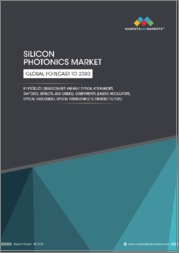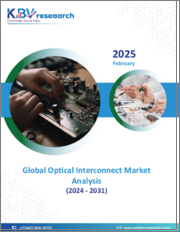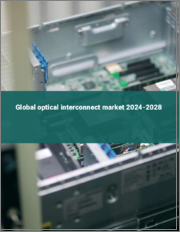
|
시장보고서
상품코드
1529434
광 인터커넥트 시장 규모 조사 : 제품 유형별, 섬유 모드별, 거리별, 데이터 속도별, 용도별, 지역별 예측(2022-2032년)Global Optical Interconnect Market Size Study, by Product Type (Single Mode Fiber, Multi-Mode Fiber), Fiber Mode, Distance, Data Rate, Application (Data Communication, Telecommunication, Others), and Regional Forecasts 2022-2032 |
||||||
세계 광 인터커넥트 시장은 2023년 약 1억 5,500만 달러로 평가되었고, 2024-2032년의 예측 기간 동안 13.5% 이상의 견조한 성장률을 보일 것으로 예상됩니다.
클라우드 컴퓨팅, 빅데이터 분석, 인공지능, 고성능 컴퓨팅 등 데이터 집약적 용도의 확산에 따라 데이터센터는 대량의 데이터를 관리하고 빠른 응답 시간을 보장해야 하는 전례 없는 문제에 직면해 있습니다. 광 인터커넥트 기술은 기존 구리 기반 인터커넥트보다 훨씬 빠른 데이터 전송 속도와 낮은 지연 시간으로 데이터센터가 더 빠르고 안정적이며 확장 가능한 연결에 대한 요구가 높아짐에 따라 이를 충족시킬 수 있습니다.
빠른 기술 발전으로 광 인터커넥트는 성능, 효율성, 확장성 측면에서 새로운 차원으로 발전하고 있으며, 데이터센터, 통신 네트워크, 고성능 컴퓨팅 시스템에서 채택이 확대되고 있습니다. 광 인터커넥트 기술에 대한 지속적인 연구와 혁신은 데이터 통신 인프라의 진화를 더욱 가속화하고 차세대 용도과 서비스를 실현할 수 있도록 지원할 것으로 기대됩니다. 통신 대역폭에 대한 수요 증가, 5G의 광범위한 도입, 데이터센터 상호연결 및 광섬유 통신에 대한 대규모 투자가 이 시장의 주요 성장 요인입니다. 또한, 통신 인프라의 확대와 AI와 ML의 통합을 통한 기술 발전은 시장 성장을 더욱 촉진하고 있습니다. 그러나 비용과 기술적 복잡성이 큰 도전과제로 대두되고 있습니다.
이 보고서는 아시아태평양, 북미, 유럽, 라틴아메리카, 중동 및 아프리카를 주요 지역으로 삼았습니다. 북미는 투자 증가와 고속 인터넷 접속 및 디지털 서비스에 대한 빠른 수요로 인해 시장 성장을 주도하고 있습니다. 또한, 아시아태평양의 광 인터커넥트 시장은 특히 중국, 인도 및 기타 동남아시아 국가의 급속한 도시화와 인구 증가로 인해 고속 인터넷 접속 및 디지털 서비스에 대한 수요가 증가하고 있으며, 이는 광 인터커넥트 인프라에 대한 투자에 박차를 가하고 있습니다. 5G 네트워크의 구축은 프론트홀과 백홀 네트워크의 요구 사항을 모두 지원하는 광 인터커넥트 솔루션에 대한 수요를 더욱 증가시키고 있습니다. 그 결과, 이 지역에서는 광 인터커넥트 인프라에 대한 수요가 크게 증가하고 있습니다.
목차
제1장 세계의 광 인터커넥트 시장 주요 요약
- 세계의 광 인터커넥트 시장 규모와 예측(2022-2032년)
- 지역별 개요
- 부문별 개요
- 제품 유형별
- 용도별
- 주요 동향
- 경기후퇴의 영향
- 애널리스트의 결론 및 제안
제2장 세계의 광 인터커넥트 시장 정의와 조사의 전제조건
- 조사 목적
- 시장의 정의
- 조사의 전제조건
- 포함과 제외
- 제한 사항
- 공급측 분석
- 가용성
- 인프라
- 규제 환경
- 시장 경쟁
- 경제성(소비자 시점)
- 수요측 분석
- 규제 프레임워크
- 기술 진보
- 친환경
- 소비자 의식과 수용
- 조사 방법
- 조사 대상년도
- 통화 환산율
제3장 세계의 광 인터커넥트 시장 역학
- 시장 성장 촉진요인
- 시장이 해결해야 할 과제
- 시장 기회
제4장 세계의 광 인터커넥트 시장 산업 분석
- Porter's Five Forces 모델
- 공급 기업의 교섭력
- 바이어의 교섭력
- 신규 진출업체의 위협
- 대체품의 위협
- 경쟁 기업간 경쟁 관계
- Porter's Five Forces 모델에 대한 미래적 접근
- Porter's Five Forces의 영향 분석
- PESTEL 분석
- 정치
- 경제
- 사회
- 기술
- 환경
- 법률
- 주요 투자 기회
- 주요 성공 전략
- 파괴적 동향
- 업계 전문가의 견해
- 애널리스트의 결론 및 제안
제5장 세계의 광 인터커넥트 시장 규모와 예측 : 제품 유형별, 2022-2032년
- 부문 대시보드
- 세계의 광 인터커넥트 시장 : 매출 동향 분석, 2022년/2032년
- 싱글 모드 섬유
- 멀티 모드 섬유
제6장 세계의 광 인터커넥트 시장 규모와 예측 : 용도별, 2022-2032년
- 부문 대시보드
- 세계의 광 인터커넥트 시장 : 매출 동향 분석, 2022년/2032년
- 데이터 통신
- 통신
- 기타
제7장 세계의 광 인터커넥트 시장 규모와 예측 : 지역별, 2022-2032년
- 북미
- 미국
- 캐나다
- 유럽
- 영국
- 독일
- 프랑스
- 스페인
- 이탈리아
- 기타 유럽
- 아시아태평양
- 중국
- 인도
- 일본
- 호주
- 한국
- 기타 아시아태평양
- 라틴아메리카
- 브라질
- 멕시코
- 기타 라틴아메리카
- 중동 및 아프리카
- 사우디아라비아
- 남아프리카공화국
- 기타 중동 및 아프리카
제8장 경쟁 정보
- 주요 기업의 SWOT 분석
- 주요 시장 전략
- 기업 개요
- Coherent Corp.
- 주요 정보
- 개요
- 재무(데이터 입수가 가능한 경우)
- 제품 개요
- 시장 전략
- NVIDIA Corporation
- Molex Incorporated
- Sumitomo Electric Industries, Ltd.
- Synopsys, Inc.
- NVIDIA Corporation
- Molex Incorporated
- Cisco Systems, Inc.
- Intel Corporation
- Broadcom Inc.
- Fujitsu Limited
- Juniper Networks, Inc.
- NEC Corporation
- Huawei Technologies Co., Ltd.
- ZTE Corporation
- Coherent Corp.
제9장 조사 과정
- 조사 과정
- 데이터 마이닝
- 분석
- 시장 추정
- 검증
- 출판
- 조사 속성
The Global Optical Interconnect Market is valued at approximately USD 15.5 billion in 2023 and is anticipated to grow with a healthy growth rate of over 13.5% over the forecast period 2024-2032. With the proliferation of data-intensive applications, such as cloud computing, big data analytics, artificial intelligence, and high-performance computing, data centers are encountering unprecedented challenges in managing massive volumes of data and ensuring rapid response times. Optical interconnect technologies offer significantly higher data transfer speeds and lower latency compared to traditional copper-based interconnects, empowering data centers to meet the escalating demands for faster, more reliable, and scalable connectivity.
The rapid technological advancements have propelled optical interconnects to new heights of performance, efficiency, and scalability, driving their adoption in data centers, telecommunications networks, and high-performance computing systems. Continued research and innovations in optical interconnect technologies are expected to further accelerate the evolution of data communication infrastructure, enabling the realization of next-generation applications and services. The increasing demand for communication bandwidth, wide implementation of 5G, and significant investments in data center interconnect and fiber optic communication are key growth drivers for this market. Additionally, the expansion of telecommunications infrastructure and technological advancements with the integration of AI and ML are further boosting market growth. However, cost considerations and technological complexities pose significant challenges.
The key regions considered in the study include Asia Pacific, North America, Europe, Latin America, and the Middle East and Africa. North America has dominated the market growth owing to rising investment and rapid demand for high-speed internet access and digital services. Moreover, the optical interconnect market in the Asia Pacific region is anticipated to witness fastest growth due to rapid urbanization and population expansion, notably in China, India, and other Southeast Asian nations, are driving the need for high-speed internet access and digital services, spurring investments in optical interconnect infrastructure. The deployment of 5G networks has further heightened the demand for optical interconnect solutions to support both fronthaul and backhaul network requirements. As a result, the region is experiencing a significant surge in demand for optical interconnect infrastructure.
Major market players included in this report are:
- Coherent Corp.
- Broadcom Inc.
- Lumentum Holdings Inc.
- Sumitomo Electric Industries, Ltd.
- Synopsys, Inc.
- NVIDIA Corporation
- Molex Incorporated
- Cisco Systems, Inc.
- Intel Corporation
- Broadcom Inc.
- Fujitsu Limited
- Juniper Networks, Inc.
- NEC Corporation
- Huawei Technologies Co., Ltd.
- ZTE Corporation
The detailed segments and sub-segment of the market are explained below:
By Product Type:
- Single Mode Fiber
- Multi-Mode Fiber
By Application:
- Data Communication
- Telecommunication
- Others
By Region:
- North America
- U.S.
- Canada
- Europe
- UK
- Germany
- France
- Spain
- Italy
- ROE
- Asia Pacific
- China
- India
- Japan
- Australia
- South Korea
- RoAPAC
- Latin America
- Brazil
- Mexico
- Rest of Latin America
- Middle East & Africa
- Saudi Arabia
- South Africa
- RoMEA
Years considered for the study are as follows:
- Historical year - 2022
- Base year - 2023
- Forecast period - 2024 to 2032
Key Takeaways:
- Market Estimates & Forecast for 10 years from 2022 to 2032.
- Annualized revenues and regional level analysis for each market segment.
- Detailed analysis of geographical landscape with Country level analysis of major regions.
- Competitive landscape with information on major players in the market.
- Analysis of key business strategies and recommendations on future market approach.
- Analysis of competitive structure of the market.
- Demand side and supply side analysis of the market.
Table of Contents
Chapter 1. Global Optical Interconnect Market Executive Summary
- 1.1. Global Optical Interconnect Market Size & Forecast (2022-2032)
- 1.2. Regional Summary
- 1.3. Segmental Summary
- 1.3.1. By Product Type
- 1.3.2. By Application
- 1.4. Key Trends
- 1.5. Recession Impact
- 1.6. Analyst Recommendation & Conclusion
Chapter 2. Global Optical Interconnect Market Definition and Research Assumptions
- 2.1. Research Objective
- 2.2. Market Definition
- 2.3. Research Assumptions
- 2.3.1. Inclusion & Exclusion
- 2.3.2. Limitations
- 2.3.3. Supply Side Analysis
- 2.3.3.1. Availability
- 2.3.3.2. Infrastructure
- 2.3.3.3. Regulatory Environment
- 2.3.3.4. Market Competition
- 2.3.3.5. Economic Viability (Consumer's Perspective)
- 2.3.4. Demand Side Analysis
- 2.3.4.1. Regulatory frameworks
- 2.3.4.2. Technological Advancements
- 2.3.4.3. Environmental Considerations
- 2.3.4.4. Consumer Awareness & Acceptance
- 2.4. Estimation Methodology
- 2.5. Years Considered for the Study
- 2.6. Currency Conversion Rates
Chapter 3. Global Optical Interconnect Market Dynamics
- 3.1. Market Drivers
- 3.1.1. Increasing demand for communication bandwidth
- 3.1.2. Wide implementation of 5G
- 3.1.3. Increasing investment in data centers interconnect & fiber optic communication
- 3.1.4. Expansion of telecommunications infrastructure
- 3.1.5. Technological advancements with the integration of AI & ML
- 3.2. Market Challenges
- 3.2.1. Cost considerations
- 3.2.2. Technological complexities
- 3.3. Market Opportunities
- 3.3.1. Growing demand for high-speed, low-latency connectivity
- 3.3.2. Expansion in emerging economies
- 3.3.3. Innovations in optical interconnect technologies
Chapter 4. Global Optical Interconnect Market Industry Analysis
- 4.1. Porter's 5 Force Model
- 4.1.1. Bargaining Power of Suppliers
- 4.1.2. Bargaining Power of Buyers
- 4.1.3. Threat of New Entrants
- 4.1.4. Threat of Substitutes
- 4.1.5. Competitive Rivalry
- 4.1.6. Futuristic Approach to Porter's 5 Force Model
- 4.1.7. Porter's 5 Force Impact Analysis
- 4.2. PESTEL Analysis
- 4.2.1. Political
- 4.2.2. Economical
- 4.2.3. Social
- 4.2.4. Technological
- 4.2.5. Environmental
- 4.2.6. Legal
- 4.3. Top investment opportunity
- 4.4. Top winning strategies
- 4.5. Disruptive Trends
- 4.6. Industry Expert Perspective
- 4.7. Analyst Recommendation & Conclusion
Chapter 5. Global Optical Interconnect Market Size & Forecasts by Product Type 2022-2032
- 5.1. Segment Dashboard
- 5.2. Global Optical Interconnect Market: Product Type Revenue Trend Analysis, 2022 & 2032 (USD Billion)
- 5.2.1. Single Mode Fiber
- 5.2.2. Multi-Mode Fiber
Chapter 6. Global Optical Interconnect Market Size & Forecasts by Application 2022-2032
- 6.1. Segment Dashboard
- 6.2. Global Optical Interconnect Market: Application Revenue Trend Analysis, 2022 & 2032 (USD Billion)
- 6.2.1. Data Communication
- 6.2.2. Telecommunication
- 6.2.3. Others
Chapter 7. Global Optical Interconnect Market Size & Forecasts by Region 2022-2032
- 7.1. North America Optical Interconnect Market
- 7.1.1. U.S. Optical Interconnect Market
- 7.1.1.1. Product Type breakdown size & forecasts, 2022-2032
- 7.1.1.2. Application breakdown size & forecasts, 2022-2032
- 7.1.2. Canada Optical Interconnect Market
- 7.1.1. U.S. Optical Interconnect Market
- 7.2. Europe Optical Interconnect Market
- 7.2.1. U.K. Optical Interconnect Market
- 7.2.2. Germany Optical Interconnect Market
- 7.2.3. France Optical Interconnect Market
- 7.2.4. Spain Optical Interconnect Market
- 7.2.5. Italy Optical Interconnect Market
- 7.2.6. Rest of Europe Optical Interconnect Market
- 7.3. Asia-Pacific Optical Interconnect Market
- 7.3.1. China Optical Interconnect Market
- 7.3.2. India Optical Interconnect Market
- 7.3.3. Japan Optical Interconnect Market
- 7.3.4. Australia Optical Interconnect Market
- 7.3.5. South Korea Optical Interconnect Market
- 7.3.6. Rest of Asia Pacific Optical Interconnect Market
- 7.4. Latin America Optical Interconnect Market
- 7.4.1. Brazil Optical Interconnect Market
- 7.4.2. Mexico Optical Interconnect Market
- 7.4.3. Rest of Latin America Optical Interconnect Market
- 7.5. Middle East & Africa Optical Interconnect Market
- 7.5.1. Saudi Arabia Optical Interconnect Market
- 7.5.2. South Africa Optical Interconnect Market
- 7.5.3. Rest of Middle East & Africa Optical Interconnect Market
Chapter 8. Competitive Intelligence
- 8.1. Key Company SWOT Analysis
- 8.2. Top Market Strategies
- 8.3. Company Profiles
- 8.3.1. Coherent Corp.
- 8.3.1.1. Key Information
- 8.3.1.2. Overview
- 8.3.1.3. Financial (Subject to Data Availability)
- 8.3.1.4. Product Summary
- 8.3.1.5. Market Strategies
- 8.3.2. NVIDIA Corporation
- 8.3.3. Molex Incorporated
- 8.3.4. Sumitomo Electric Industries, Ltd.
- 8.3.5. Synopsys, Inc.
- 8.3.6. NVIDIA Corporation
- 8.3.7 Molex Incorporated
- 8.3.8 Cisco Systems, Inc.
- 8.3.9. Intel Corporation
- 8.3.10. Broadcom Inc.
- 8.3.11. Fujitsu Limited
- 8.3.12. Juniper Networks, Inc.
- 8.3.13. NEC Corporation
- 8.3.14. Huawei Technologies Co., Ltd.
- 8.3.15. ZTE Corporation
- 8.3.1. Coherent Corp.
Chapter 9. Research Process
- 9.1. Research Process
- 9.1.1. Data Mining
- 9.1.2. Analysis
- 9.1.3. Market Estimation
- 9.1.4. Validation
- 9.1.5. Publishing
- 9.2. Research Attributes


















